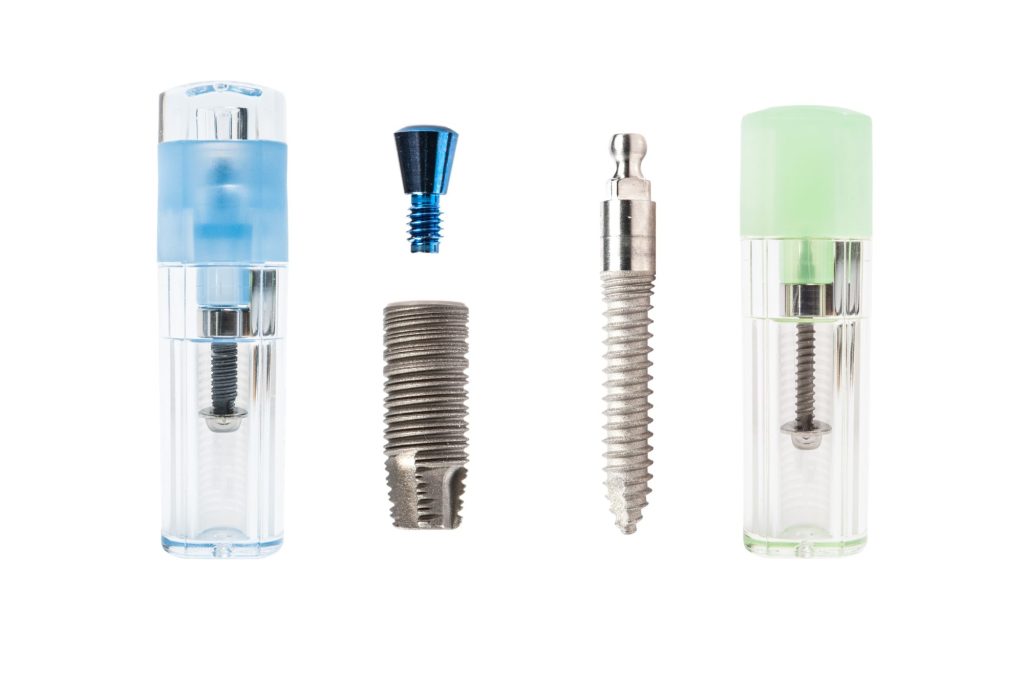When it comes to maintaining your smile and oral health, you may need help beyond your regularly scheduled dental cleanings. Fortunately, today there are various ways to go about this, including undergoing a restoration or cosmetic dental procedure to receive dental implants.
Whether you are missing a tooth or experience damage to one or more, dental implants are often the best solution for restoring your smile and increasing your oral health over the long term. Since all patients’ mouths are unique, your dentist can discuss the different types available and help you discover the benefits they offer.
What Exactly are Dental Implants?
Dental implants serve as a restoration solution for different types of dental issues. Essentially, they consist of a titanium post surgically inserted below the gum line, most often into the jawbone, which serves as an artificial tooth root.
The post itself resembles a screw and, once implanted, begins to fuse with the natural bone to create a stable, firm foundation. On top of this post will be an abutment that will connect, or hold, an artificial or prosthetic tooth (crown) in place.
One benefit to the implant is that it can preserve the structure of the bone in your jaw and prevent further loss. It can also become a foundation for more than just one tooth, including support for a bridge or even dentures.
With the help of good oral hygiene habits and regular dental visits, dental implants can last a lifetime. You may, however, need to replace the crown at different times as they tend to wear down.
What are the Different Types of Implants?
There are different types of implants, with each involving a unique procedure and placement of the post. The most common ones are endosteal, subperiosteal, and zygomatic. Essentially, the main difference between these three is the way they are attached.
Endosteal implants
Endosteal implants are the most common choice. A tiny screw-like post is embedded in your jawbone, which then fuses to the bone and serves to hold a custom-made prosthetic tooth in place. In order to be a candidate for this type of implant, you must have a strong, healthy jawbone already.
The endosteal implant can support one crown or, when combined with one or more other implants, can create a base for bridges or dentures.
Subperiosteal implants
A subperiosteal implant is a metal frame that is positioned directly on or slightly above the jawbone yet still resting under the gum. Attached is a post that will stick through the gum, and this is where a prosthetic tooth will sit.
As the gum heals, the frame is kept in place, providing a stable base for the artificial root. These implant types are commonly used to support bridges and dentures.
Patients with a less healthy jawbone that can’t accommodate an endosteal implant will benefit from this type, as will those who are unable to wear regular dentures. Others who wish to avoid additional invasive procedures, such as bone augmentation, can go with subperiosteal implants as well.
Zygomatic Implants
Less common, zygomatic implants involve insertion into the cheekbone instead of the jawbone. Patients with inadequate bone structure or density in the upper regions of the mouth may be candidates for this type of implant, and it is usually reserved for those requiring a full mouth reconstruction.
What are the Different Types of Implant Solutions for Patients?
Patients can choose to replace a single tooth, multiple teeth, or a full mouth with the use of dental implants.
Single Tooth Implant
A single tooth implant is usually the solution to losing a tooth or experiencing excessive damage or trauma to one. Only one post and a crown are necessary, and these will replace the entire tooth structure.
Implant-Supported Bridge
An implant-supported bridge is a viable solution for when there is a loss of multiple teeth adjacent to each other. A dental implant will be placed at both ends of the affected area (missing teeth), and a bridge will fill the gap. You may have one, two, or three artificial teeth between the two implant locations, but not all of the missing teeth will need their own implant.
Implant-Supported Dentures / Implant-Retained Dentures
For those patients missing all or a large majority of teeth in the upper or lower arch, an implant-supported or retained denture is an option.
Unlike regular dentures, which sit on the gum line and have the potential to move or slip as you eat, talk, or laugh, these implant-supported ones are permanently secured in place.
Four dental implants will be inserted along the arch. While these heal, modified dentures may be worn while the dental lab works to create new ones. Once healed, however, a customized denture will be attached to the implanted posts.
What Type of Dental Implant is Best?
When it comes to what type of dental implant is best for you, the answer will depend on a few factors. Every mouth is unique, and the loss of teeth requires a customized solution to meet the needs of the patient in terms of oral health and facial aesthetics.
The dental implant type you choose will all start with an examination by your dentist. During this exam, the dentist will determine the number of teeth that need replacing, how healthy your jawbone is presently, and any other individual issues and needs you may have. With this information, your dentist can discuss the different procedures available before proceeding.
Yet, in order for any dental implant to work, you’ll need enough healthy bone for the necessary fusing to occur to create a stable foundation. The longer any tooth is missing, the more it can affect the health of the surrounding bone, and if you wait too long, you may not have enough bone available.
If this occurs, you may need to consider undergoing bone augmentation or grafting procedures. Otherwise, you will have to discuss with your dentist the other types of implants available, such as subperiosteal or zygomatic, and see if they will be beneficial to you.
Learn More About Dental Implants by Contacting South Dayton Smiles Today
To learn more about the type of implants available and which type might be best for you, contact South Dayton Smiles today. Schedule a consultation by calling 937-446-6781 or by using our convenient online contact form.

 Meet Dr. Botti
Meet Dr. Botti
 Meet Dr. Scranton
Meet Dr. Scranton
 Our Team
Our Team
 Patient Forms
Patient Forms Online Bill Pay
Online Bill Pay Benefit Program
Benefit Program Your First Visit
Your First Visit